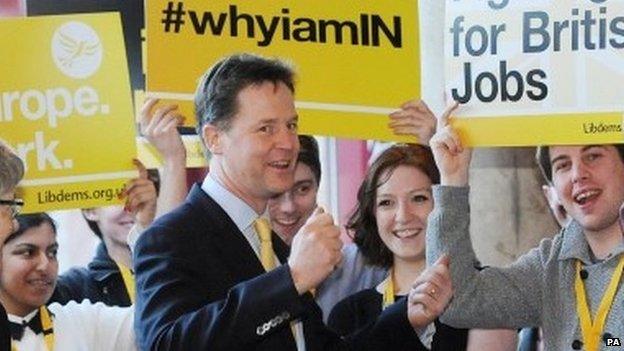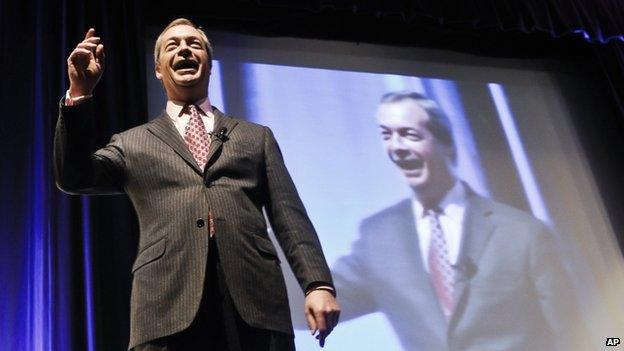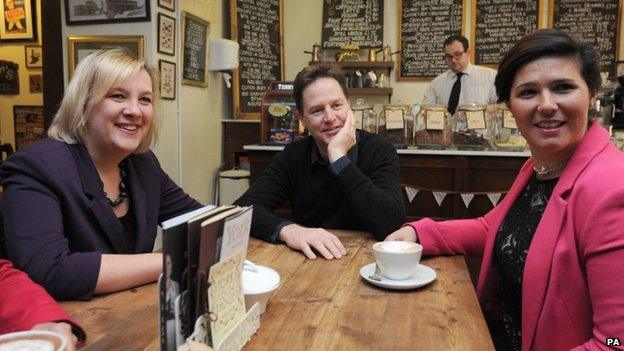Nick Clegg wants IN, but what about voters?
- Published

It is probably the pithiest slogan in politics.
Visitors to this Liberal Democrat spring conference have been confronted with two large blocks of yellow wood in the foyer.
One is the letter "I", the other an "N".
Sadly there are not any other letters so mischievous party members are unable to create their own rude words. Not that they would.
Liberal Democrats are a well behaved lot, loyal to their party and this leader at least. No matter how low in the polls they go, no matter how much they privately fear a hammering at the European and general elections, party members remain remarkably chipper.
They strongly believe it was right to go into coalition with the Conservatives and are proud of what they have achieved.
The problem is of course that many voters strongly disagree. Half the party's 2010 support has vanished, most of it to Labour.
Pantomime villain
But it is not Ed Miliband's name getting mentioned here much. Instead it is the smoke-puffing shadow of UKIP's leader Nigel Farage that looms over this conference.
He is York's pantomime villain and his name crops up in almost every speech. In his address, Nick Clegg said that "the politics of blame has found an acceptable face - it wears a big smile and looks like someone you could have a pint with down the pub".

Is UKIP's Nigel Farage the perfect bogeyman for Lib Dems?
But the Lib Dem leader accused UKIP of promoting an "ungenerous, backwards-looking politics".
It is a flavour of the ad hominem attack Mr Clegg will take to Nigel Farage in April's television and radio debates. So what is going on?
The Liberal Democrats have 11 MEPS, 12 if you count Edward McMillan-Scott, who defected to them from the Conservatives in 2010.
There is real fear in the party that these could be wiped out in the elections on 22 May - a poll UKIP is hoping to top. Which is why the Liberal Democrat tactic is to frame the election as a simple choice: UKIP who want Britain to get out of Europe and the Liberal Democrats who believe Britain must be in.
This is why "IN" is the word plastered all over this conference. By trumpeting a passionate commitment to the EU and Britain's membership of it, the Lib Dems are hoping to win the votes of pro-European Tory and Labour voters too.
It is only the Lib Dems, Mr Clegg argues, who unequivocally argue Britain's interests are best served by EU membership. He will criticise the Conservatives, who promise a referendum on EU membership by the end of 2017, for having "one foot out the door".

Lib Dem delegates appear happy with their leader's performance
So will this tactic work? The thinking is that voters will respect the Lib Dems for sticking to their principles, fighting for an issue that has met with scepticism or boredom in much of public life.
But European elections are rarely about Europe. The result usually reflects how voters feel about the state of domestic politics. And at the moment the Lib Dems are adrift at about 10% in the opinion polls. Translated to a European election that uses a proportional voting system, it is easy to see why they are worried.
Meanwhile, the "differentiation" strategy picks up pace. On Europe, tax and immigration the Lib Dems are sharpening their attacks on the Conservatives.
This conference has revealed sincere Lib Dems' fury at what they see as a Tory attempt to purloin their flagship policy - raising the personal allowance to £10,000.
In recent months, Conservative ministers have talked with pride about this coalition tax cut.
And there is clearly a proper behind-the-scenes battle going on about whether it goes up again in this month's Budget.
Some coalition "rows" are manufactured for the mutual benefit of both parties. This one is not.
But Nick Clegg's central message remains the same - that his party was right to form a solid coalition with the Conservatives to deal with the economy, despite the political price it has paid.
But the electoral credit the Lib Dems yearn for still looks elusive.
- Published9 March 2014
- Published5 March 2014
- Published7 March 2014
- Published9 March 2014